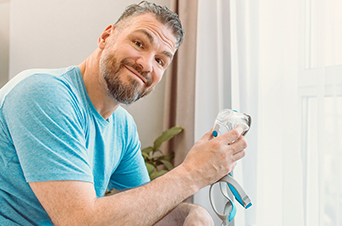
Continuous positive airway pressure (CPAP) is one of the effective treatments for obstructive sleep apnea. OSA is when the muscles in the tongue and throat relax, obstructing the airway, leading to interruption in breathing and sleep. There are many risk factors involved in sleep apnea, including obesity which plays a crucial role. However, while obesity leads to OSA, it also causes people to gain weight, triggering a continuous cycle. CPAP therapy offers many benefits, such as high-quality sleep, lessened daytime fatigue, and snoring while sleeping. In this blog, we will learn the body changes after CPAP.
Physical and Health Challenges Before CPAP Therapy
Chronic Fatigue and Daytime Sleepiness:
Chronic fatigue is one of the many symptoms of sleep apnea; it results from sleep interruptions that an individual experiences at night. So, they wake up tired, no matter how long they have been in bed. This dull state leads to feeling exhausted and drowsy during the day. Moreover, due to their daytime sleepiness, people find it challenging to stay awake during the day, which reduces their ability to concentrate on performing daily tasks. This lack of focus can be risky while doing technical or mechanical tasks or activities like driving.
Also Read: Is Narcolepsy Genetic: Everything You Need to Know!
Headaches and Migraines:
Morning headaches commonly occur in people suffering from sleep apnea. These are typically caused by changes in oxygen and carbon dioxide levels, which cause vasodilation, and can lead to headaches. Furthermore, fragmented sleep leads to migraines and tension headaches. These can further reduce the quality of life and cause difficulty in focusing and managing daily responsibilities. Treating OSA and consequently migraines help improve quality of life, contributing to significant body changes after CPAP.
High Blood Pressure and Cardiovascular Risks:
There are many health issues associated with untreated sleep apnea such as high blood pressure or hypertension. The frequent episodes of reduced breathing cause stress on the cardiovascular system. Each apnea event triggers a surge in sympathetic nervous system activity, leading to increased blood pressure. With time, this can lead to sustained hypertension, even during the day.
Sleep apnea can increase the risk of heart diseases, including arrhythmias and heart attacks. Due to fluctuating oxygen levels and increased blood flow, it causes a continuous strain on the heart, which can lead to structural changes in the heart and arteries. If it stays untreated, then it can also introduce the risk of stroke. The combination of hypertension, reduced oxygen supply to the brain, and increased stress on the cardiovascular system contributes to this elevated risk.
Weight and Sleep Apnea:
There is an important relationship between sleep apnea and weight gain, which can create a cycle of health issues. Excess weight, particularly in the upper body, can contribute to the development of sleep apnea. This is due to the increased fat percentage around the tissues of the airway, leading to obstruction and breathing difficulties during sleep. This problem is more pronounced in individuals with a higher body mass index (BMI), resulting in more frequent and severe apnea events.
On the other hand, sleep apnea can be a cause of weight gain in people suffering from this condition. It may be due to daytime sleepiness and chronic fatigue, which can reduce energy levels and the motivation to do any physical activity. Furthermore, sleep deprivation affects the levels of hormones that regulate hunger and appetite, such as ghrelin and leptin. This hormonal change led to appetite and cravings for high-calorie foods, a prominent factor contributing to weight gain. This sets in motion the cycle between obesity and sleep apnea.
Body Changes After CPAP
Decrease in Apneas and Hypopneas:
CPAP therapy can significantly reduce the frequency of pauses in sleep (apneas) and shallow breathing (hypopneas) during sleep. CPAP ensures a steady flow of air by keeping the airway open and preventing the obstruction that causes these breathing interruptions. This leads to a more stable and continuous breathing pattern throughout the night, drastically reducing the disturbances that disrupt sleep.
Regular Sleep Patterns and REM Sleep Restoration:
With CPAP therapy, individuals can achieve more regular sleep as the interruptions are lesser now. They can experience various stages of sleep such as REM which is crucial for your cognitive functions and emotional health. By restoring normal sleep patterns, CPAP therapy enhances the overall quality of sleep, leading to a more refreshed and revitalized feeling upon waking.
Energy Levels and Daytime Alertness
Reduction in Fatigue and Sleepiness:
One of the effects of sleep apnea that people notice a lot is the reduction in daytime sleepiness and fatigue. This is because of the improved sleep quality and lessen nighttime awakenings, individuals feel more rested. Moreover, the decrease in fatigue allows them to stay awake and alert during the day, enhancing their ability to focus on performing daily tasks. Hence, this is one of the significant body changes after CPAP helping people excel in their daily lives.
Reduction in Depression and Anxiety:
The improvement in daytime alertness leads to better productivity, and individuals with CPAP therapy can complete their daily tasks with greater efficiency. This is the primary reason why people find themselves less depressive and anxious and have a more positive attitude.
Cardiovascular Health Benefits
Lower Blood Pressure:
Consistent use of CPAP therapy has also proven effective in lowering blood pressure and reducing the stress on the cardiovascular system caused by apneas and hypopneas. CPAP therapy helps to normalize blood pressure levels.
Reduced Risk of Heart Attack and Stroke
CPAP therapy can also reduce the risk of having a heart attack in an individual dealing with sleep apnea. It mitigates the harmful effects of sleep apnea (such as irregular heart rhythms and increased blood pressure) on cardiovascular health. By maintaining a stable oxygen supply during sleep, CPAP therapy protects the heart and blood vessels, significantly lowering the risk of life-threatening cardiovascular events.
Weight Management and Metabolic Changes
Weight Loss Facilitation:
CPAP therapy plays a crucial role in managing body weight and individuals have witnessed potential body changes after CPAP. Improving sleep quality leads to better energy balance and metabolism, thus making it easier for people to engage in physical activity and maintain a healthy weight. Additionally, the reduction in daytime sleepiness enhances motivation to exercise, further supporting weight loss efforts.
Improvements in Metabolic Health:
Once your weight is managed, the metabolism also starts working efficiently. This can be seen in improving conditions like insulin resistance and stabilizing blood sugar levels. Hence, reducing the risk of developing diabetes in people with sleep apnea and improves the management of existing metabolic conditions.
Conclusion
In conclusion, many body changes after CPAP have been observed. Enhanced sleep quality, characterized by fewer apneas and hypopneas, leads to more regular sleep patterns and restoration of crucial REM sleep. These body changes after CPAP result in increased energy levels, reduced daytime sleepiness, and improved mood stability, contributing to greater productivity and emotional well-being.
Additionally, CPAP therapy’s benefits extend to cardiovascular health by lowering blood pressure and reducing the risk of heart attacks and strokes. Importantly, CPAP therapy aids in weight management and metabolic health. Furthermore, it not only addresses the immediate symptoms of sleep apnea but also provides long-term health benefits. If you are looking for a renowned facility to treat your sleep apnea, you can visit this site.

